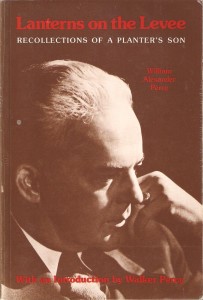Major Works
Non-fiction
- Lanterns on the Levee: Recollections of a Planter’s Son (1941)
Poetry
- Of Silence and Stars (1953)
- The Collected Poems of William Alexander Percy (1943)
- Selected Poems (1930)
- Enzio’s Kingdom, and Other Poems (1924)
- In April Once, and Other Poems(1920)
- Sappho in Levkas, and Other Poems (1915)
William Alexander Percy: A Biography
by Britton Boyd (SHS)
The Mississippi Delta, with its rich culture and history, has provided the South with many talented writers. Watts and others have called Greenville, Mississippi, (where William Alexander Percy lived), the “Athens of the Delta” because of its more than seventy published authors. William Alexander Percy deeply cherished the heritage he had inherited growing up as a planter’s son.
William Alexander Percy was born on May 18, 1885, to LeRoy and Camille Percy. LeRoy Percy was a prosperous planter-lawyer and U.S. Senator, and Percy enjoyed a youth of privilege growing up in Greenville, Mississippi. Percy spent his early life under the gentle wing of his grandmother, Nannie Armstrong (Wyatt-Brown 194). Percy’s early education was received at the Sisters of Mary convent. Percy developed an intense devotion to Catholicism as a student there (Baker 60). His parents were displeased with his announcement that he wanted to become a priest, so he was taken out of the school and given a personal tutor. The hours spent reading classics with his personal tutor, Judge Griffin, gave Percy a passion for literature and writing (Baker 60).
William Alexander Percy went to college at the University of the South (Sewanee). While at Sewanee, Percy’s younger brother LeRoy was accidentally killed by a rifle at the age of ten. Baker states, “The apparent injustice of his brother’s death may have contributed to Will’s loss of his intense faith in Catholicism” ( 60). After Percy’s graduation from Sewanee in 1904, he spent a year traveling Europe and Egypt (Abbott 354). Upon his return, Percy enrolled in Harvard University to become a lawyer, as his family had encouraged him to do. After graduating from Harvard in the spring of 1908, Percy taught a semester at Harvard. Then, after a brief respite in Europe with his father, William Alexander Percy returned to Greenville to become a lawyer.
Percy wrote poetry as he practiced law, and “in 1915 Yale University Press recognized the young poet by bringing out a volume of his verse” (Baker 67). Sapphos and Levkas and Other Poems was his first volume of poems published. Soon after, the Great War (WWI) brought Percy back to Europe. Percy served on the Commission for Relief in Belgium during 1916. He also served in the U.S. Army during 1917-1919. He was awarded the Croix de Guerre in 1918 and became a captain (Scafidel 174).
When Percy returned to America after the Great War, he found it difficult to fit himself back into Greenville’s easygoing way of life. The coming years were turbulent because of a sudden emergence of the Ku Klux Klan in Greenville. LeRoy and William Alexander Percy’s opposition to the Ku Klux Klan was the main reason that the racists did not overtake all the political offices of Greenville. In 1927, disaster struck with the advent of the greatest Mississippi River flood in many years. According to Scafidel, “Aside from his writing, Percy is best known for his leadership at home during the Mississippi River floods” (174). Percy was the chairman of the Disaster Relief Committee of the Red Cross in Mississippi during the flood and its aftermath. In 1929, both of William Alexander Percy’s parents died within a few weeks of each other, leaving Percy with sole possession of his father’s land and law practice. After the death of his parents, Percy wrote poetry no more.
In 1931, Percy’s three young cousins were orphaned when their mother died after driving off a county bridge. Percy adopted Walker, LeRoy, and Phinizy Percy and raised them as his own (Abbott 354). The boys grew up immersed in art and literature, and Walker Percy went on to become a novelist of greater fame than his adoptive father. In the introduction to Lanterns on the Levee, Walker Percy says of William Alexander Percy, “I will say no more than that he was the most extraordinary man I have ever known and that I owe him a debt which cannot be paid” (Abbott 355). Percy spent a large amount of time caring for his boys but managed to write an autobiography at the urging of Alfred Knopf, his publisher. His autobiography was completed just months before his death. William Alexander Percy’s memoir, Lanterns on the Levee: Recollections of a Planter’s Son, was critically acclaimed and has become his most famous work. William Alexander Percy was a writer and poet, and he was extremely active in the political, cultural, and social life of Greenville, Mississippi. He died on January 21, 1942.
Reviews
A Review of Lanterns on the Levee
by Britton Boyd (SHS)
Lanterns on the Levee is elegantly written with a style and quiet flair all its own. The autobiographical novel conveys Percy’s view that the southern aristocracy and its highly regarded place in southern society was rapidly declining. The book shows Percy’s desire to demonstrate the continuing usefulness of values considered outdated by contemporary society. Lanterns on the Levee paints a vivid picture of life on the Delta as it changed before Percy’s eyes over his lifetime. The subtle metaphors scattered throughout the novel draw one deeper into his web of words. For example, the “Levee” referred to in the title is a metaphor for tradition. Percy believed in the “erection” and “maintenance” of tradition to keep human nature under control. The “Lanterns” referred to in the title probably refers to his recollections. His recollections are his means of shedding light upon his views. “William Alexander Percy composed Lanterns on the Levee. . . as an homage to his ancestors, an example to his young nephews, and an answer to critics of the South” (Parks 318).
William Alexander Percy’s views of African-Americans and poor whites are occasionally racist or pretentious, but the time period in which he grew up in must be taken into consideration. During his time, Percy was sometimes regarded as a flaming liberal and was hated by the Ku Klux Klan. Percy was a staunch defender of African-Americans against the odious Ku Klux Klan. Percy frequently compares the Ku Klux Klan to the Nazis.
Lanterns on the Levee is a well-written and enjoyable memoir. It takes one back in time on a nostalgic trip to a place where life is simpler and uncorrupted by the influences of a more modern era that Percy felt increasingly uncomfortable with. Lanterns on the Levee is a highly entertaining and engrossing tale that cannot be put down until the last word has been read.
Related Websites
- Extensive summary of Walker Percy: A Life , (nephew of William Alexander Percy) by Patrick H. Samway, S. J.
- Mississippi Writers page on Percy
- Reader’s reviews of Lanterns on the Levee on Amazon.com are online here.
- Will Percy Biography on MPB American Experience
Bibliography
- An Anthology of Mississippi Writers. edited by James R. Scafidel et. al. Jackson, Mississippi: University Press of Mississippi, 1979.
- Percy, William Alexander. Lanterns on the Levee: Recollections of a Planter’s Son. Baton Rouge, Louisiana: Louisiana State University Press, 1941.
- Parks, Edd Winfield. Segments of Southern Thought. Athens, Georgia: University of Georgia Press, 1938.
- Baker, Lewis. The Percys of Mississippi. Baton Rouge, Louisiana: Louisiana State University Press, 1983.
- Wyatt-Brown, Bertram. The House of Percy. New York: Oxford University Press, 1994.
- Contemporary Authors. Volume 163. Detroit, Illinois: Gale Research Co., 1984.
- Mississippi Writers: An Anthology. edited by Dorothy Abbott. Jackson, Mississippi: University Press of Mississippi, 1991.

